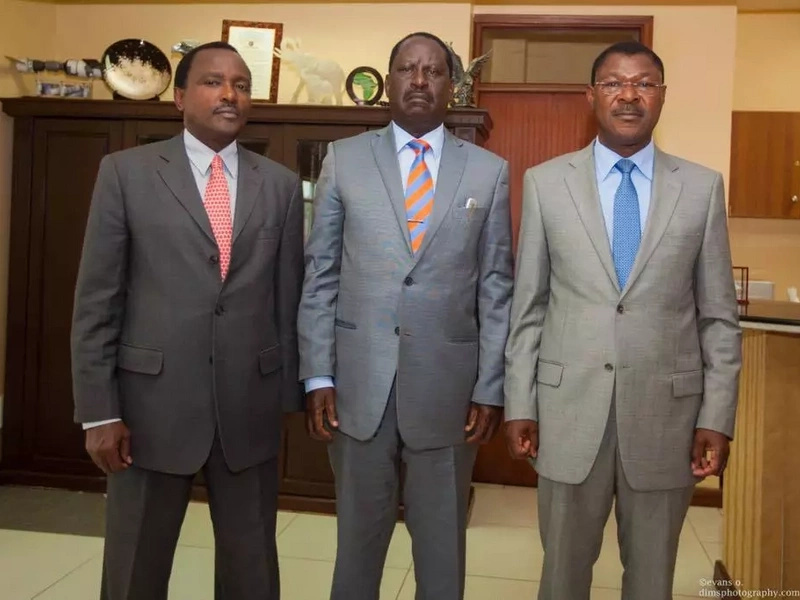
Editor’s note: Raila’s call for the disbandment of the Independent Electoral and Boundaries Commission (IEBC) has got everyone in Kenya’s political ring talking now. Raila says that IEBC cannot be allowed to referee 2017 general election as presently constituted. But in this piece, Peninah Muriithi, writes that Raila’s call is only a political game to keep him relevant.
Sometime after the 2007 general elections, the then Electoral Commission of Kenya (ECK) was on the spot for mismanaging the elections. Its chairman, the late Samuel Kivuitu, was accused of making irresponsible statements to the effect that he was not aware who won the elections. Earlier, as tension was building up over delayed results, Kivuitu observed, in his typical light-hearted style, that some returning officers could have been ‘cooking’ results.
Raila Odinga’s Orange Democratic Movement (ODM), locked in a tight contest with Mwai Kibaki’s Party of National Unity (PNU), did not take the comments lightly. Kivuitu eventually declared Kibaki the winner of the contest, an announcement that plunged the nation into one of its darkest moments, with communities rising against each other in an orgy of violence and ethnic cleansing.
Rightly or wrongly, many blamed ECK and its chairman for handling the elections carelessly and setting the stage for the post-election violence (PEV). No one cared to listen to their story. In fact, the country was in no mood to do so.
The reforms that followed saw the setting up of the Interim Independent Electoral Commission (IIEC) chaired by Mr. Isaack Hassan. IIEC was later replaced by the Independent Elections and Boundaries Commission (IEBC) following the promulgation of the new constitution in 2010. Hassan, who had demonstrated fairness, credibility and competence in handling several by elections as well as the referendum that gave birth to the new constitution, was given another mandate to lead IEBC. It is worth noting that during this period, Odinga was a co-principal in the coalition government and his ODM coalition enjoyed a clear majority in Parliament.
When Odinga and his CORD coalition demanded the dissolution of IEBC following his loss in the 2013 presidential elections, I was disappointed but not surprised. IEBC did experience challenges in the management of the elections but if CORD were to be fair, they would acknowledge that no institution is perfect and that technology can collapse at a time no one expects it to. Did the challenges experienced by IEBC affect the outcome of the presidential elections? Well, the Supreme Court, the highest court in the land, which counts among its justices second liberation leading lights and top legal scholars, did confirm the results reflected the will of the majority.
Odinga’s style has been to keep the nation permanently on the edge to keep his political career alive. By making his supporters believe that he did not really lose the elections but was rigged out by his opponents and IEBC, he not only plays into their raw anger and victimhood, he also gives them hope that he can actually win an election if the playing field is ‘level.’ IEBC is a victim of this political conspiracy.It is interesting that CORD has not demonstrated how IEBC is biased against it or how it will ensure that a new set of commissioners will play ‘fair.’ It will be sad if political players agree to send commissioners home only to replace them with a new set with limited or no experience and who likely will face the same challenges given the Kenya electoral terrain remain more or less the same.
It is also unfair to condemn the entire commission yet each individual is responsible for his or her own actions. If CORD, or any other entity for that matter, has issues with any of the commissioners or any employee at the secretariat, the law is clear on how such a commissioner or employee can be removed from office. CORD should follow the law in this regard and spare the country high octane politics, whose ultimate objective is to set the stage for rejection of the 2017 presidential election results, in case they lose.
Ms. Muriithi is Chief Communications Adviser at the Africa Center for Strategic Futures (ACSF): Kenya Project.
This article expresses the author’s opinion only. The views and opinions expressed here do not necessarily represent those of The Legacy or its Editors. We welcome opinion and views on topical issues.
SOURCE: tuko.co.ke.

No comments:
Post a Comment